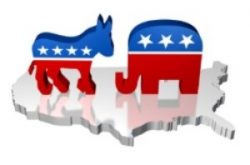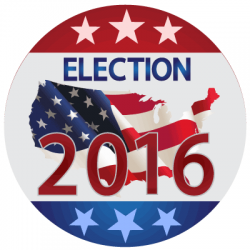Politics At Work: Don’t Let the Election Season Disrupt Your Workplace!
October 7, 2016 2:15 pmPolitics At Work: Don’t Let the Election Season Disrupt Your Workplace!
The 2016 Presidential election has been interesting, to say the least. It’s hard to find someone who doesn’t hold passionate views for, or against, either of the main candidates. And as much as we strive for a harmonious workplace, political discussions are bound to come up as we move closer to Election Day.
There are numerous reasons to avoid heated political debate in the workplace including decreased productivity and negative morale. Even if the conversation stays calm, it can be hard to switch gears and focus on work after expending mental energy defending your views. Even worse, these discussions could create risk for claims of discrimination or hostile work environment. Protected characteristics including gender, religious beliefs, race, and age could easily become topics of discussion and a harsh remark may sow the seeds of a legal complaint.
But before you print out that memo banning all political dialogue, it’s important to remember the National Labor Relations Board’s views on concerted activity. Employees, whether unionized or not, have broad rights to discuss the terms and conditions of employment. To the extent that their support for, or opposition to, a candidate relates to job-related topics, prohibiting political speech could be viewed as a violation of their rights. For example, campaign issues like the minimum wage, pay equity, health insurance, and immigration could generate protection under the NLRA.
In addition, California Labor Code section 1101 prohibits company policies that would prevent employees from “engaging or participating in politics” or attempt to “control or direct the political activities” of employees. These rules generally apply to activities outside the workplace, but could be loosely interpreted to cover in-office speech, as well.
So how can you maintain control of your workplace without infringing on employees’ rights? You already have policies in place that can help, and this may be a great time to revisit them. Use your Employee Handbook to remind your staff that:
• Employees are expected to treat each other with respect and courtesy at all times.
• Personal conversations should not disrupt the efficient production of work.
• Solicitations (including political postings) are not permitted during work hours.
• Negative comments about protected personal characteristics will not be tolerated.
• Employees may not make social media posts that give the impression the company supports any political cause or candidate.
• Employees may be permitted paid time off to vote if the work schedule prevents them from voting, or unpaid time off to serve as an election official.

If you do encounter an employee whose political fervor is in violation of your policies, a verbal or written warning may be in order. Be sure to restrict the disciplinary action to job-related behaviors, rather than the employee’s personal views.
And thankfully, November 8th is just a few short weeks away. Regardless of which candidate wins, your employees will soon settle back into normal routines and conversations…for the next four years, at least.
Want to read the full newsletter? Become an HR Business Partner and receive our monthly updates by email.
